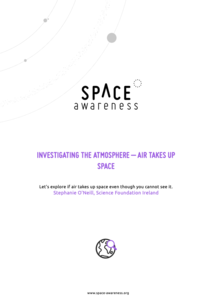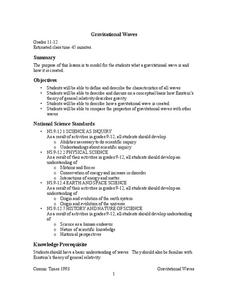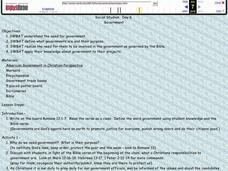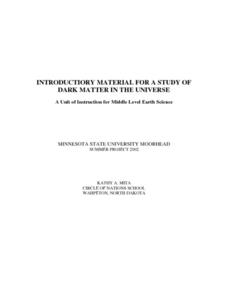Space Awareness
Investigating the Atmosphere - Air Takes Up Space
How do you know there is air? Can you see it, smell it, feel it? To begin the investigation, learners watch a video and discuss what they know about air and the atmosphere. Then, they participate in five different hands-on, inquiry-based...
Laboratory for Atmospheric and Space Physics
The Planets and Scale
Scholars gain an insight into the relative size of planets and distance between inner and outer planets with the help of informational text, a data table, and a series of four questions.
Space Awareness
Living in the Milky Way
Get to know our galaxy with an astronomy-themed, hands-on activity. Scholars watch an informative video, answer questions, and construct a model of the Milky Way in order to examine its contents and the distance inside it.
PHET
Learning about Space Weather
Is the sun the only celestial body with magnetic fields? A guided discussion on the weather in space is designed with a mix of questions, discussions, explanations, and applications. Additionally, the resouce includes an...
Laboratory for Atmospheric and Space Physics
Charting the Progress of New Horizons
In 2006, New Horizons began its mission to fly to Pluto. As it continues its journey, scholars track its progress with the help of an informative website, all the while reinforcing measurement concepts with the construction of a scaled...
University of Colorado
Astro-Chronology
Class members play a version of the game Chronology to determine when certain scientific events occurred in history. Teams play until someone has 5-10 events in the correct order.
Discovery Education
Motion in the Ocean
How do temperature changes affect ocean currents? Scholars explore convection currents by demonstrating the flow of water in a baking dish. They use ice, heat, and food coloring to see currents. Then, they draw conclusions about their...
American Museum of Natural History
What is Astronomy?
Go study the universe. Pupils learn seven aspects about astronomy and astronomers. They begin to learn about constellations; distance and motion between objects; gravity; the electromagnetic spectrum; dark matter and energy; and teams of...
NASA
Gravitational Waves
Young scientists participate in a hands-on experiment to explore Einstein's theory of relativity in a creative manner. They investigate various waves and compare their characteristics as they discuss how each wave is created....
Prairie Public Broadcasting
Egyptian Pyramids Virtual Field Trip!
A virtual field trip takes enthusiastic travelers to the pyramids of Giza. Using Google, scholars explore the grounds of the ancient pyramids found in Egypt then complete three worksheets: a photo analysis page, a reflection sheet, and a...
Curated OER
Animals and Humans
Students identify the functions of various body parts. They participate in the "Head, Shoulders, Knees, and Toes" song, draw a picture of themselves and other mammals, and create a traced outline of their body that they add features to....
Australian Government
The Great Artesian Basin
Covering 23% of the continent and holding 64,900 cubic kilometers of water, the Great Artesian Basin is the primary source of water for much of inland Australia. Using detailed student worksheets, experiments, and case studies,...
National Energy Education Development Project
Introduction to Solar Energy
People have been using solar energy for many generations to dry crops, heat homes, and for light. This presentation explains how now it is possible to capture the solar energy and store it for future use, details how and where...
Colorado State University
What Is a "Model"?
Model the transfer of energy during a typical 24-hour period. Young scholars use a game-like approach to learning the patterns of heat transfer through the day and night. Groups of four exchange different tokens as the energy...
Workforce Solutions
A Colony for Lunar Living
Two lessons explore the possibility of living on the moon. First, scholars read various scenarios to identify which careers would best transfer to life in space. Finally, pupils examine a website to locate items made for outer space,...
Curated OER
Government
Perfect for a Christian or private school setting, this lesson has learners use their Bible to help them identify the purpose of the government. They examine specific Bible verses then use them to define the government and the...
Curated OER
Western Civilizations, Chapter 2: Gods and Empires in the Ancient Near East
Ancient Hebrew history comes to life through this online western civilizations tool, which follows history in detail from ancient origins to modern-day. Chapter two covers ancient eastern cultures, including beginnings of Hebrew...
Curated OER
Reproduction, Day 3: Parenthood
Reproduction can result in parenthood. Discuss the pros and cons, responsibility, and possible results of sexual intercourse. Intended for a secondary special education class, this lesson is developmentally appropriate for mild to...
Lunar and Planetary Institute
Oreo Moon Phases
Learning about the moon has never tasted delicious! Using the popular Oreo cookie as a model, young scientists carve out the cream filling to represent the different phases of the moon.
Laboratory for Atmospheric and Space Physics
Looking to the Future
New Horizons set forth on a mission to Pluto in 2006. Ten years later, the spacecraft is still on its way. Here, enthusiastic scholars predict what they will be like—likes, dislikes, hobbies, etc.—when New Horizons arrives at its...
Curated OER
Dark Matter In The Universe
Learners investigate the concept of dark matter and how it occurs in the universe. They conduct research using a variety of resources. Students use the information by reading at least two articles about dark matter. They also generate...
Curated OER
Mass, Volume, and Weight
Students explore mass, volume, and weight. In this science and measurement lesson plan, students compare volume, mass, and weight after listening to the teacher's description of each. Students explore different scales and balances and...
Curated OER
Galileo's Dialogue
Explore how Galileo's controversial theory raised objections in his time. In this physical science activity, learners research about current controversial issues. They role play both sides of the issue, and decide which one has a...
Curated OER
Where Am I?
Extensive background on marine navigation is provided for you as the teacher. Assign groups to research marine navigation techniques and construct astrolabes. Resource links are listed for extension ideas. If you are teaching an...
Other popular searches
- Earth System Origins
- 4 Major Earth Systems
- Moon Earth System
- Earth Systems Unit
- Major Earth Systems
- Earth Systems Interactions
- Sun Earth Moon System
- Earth Systems Global Winds
- Earth Systems 3209
- Earth Systems Science
- Earth Systems and Patterns
- Earth System Atmosphere

























